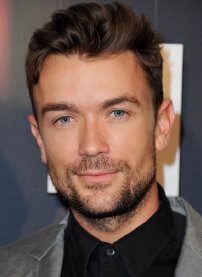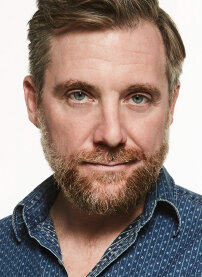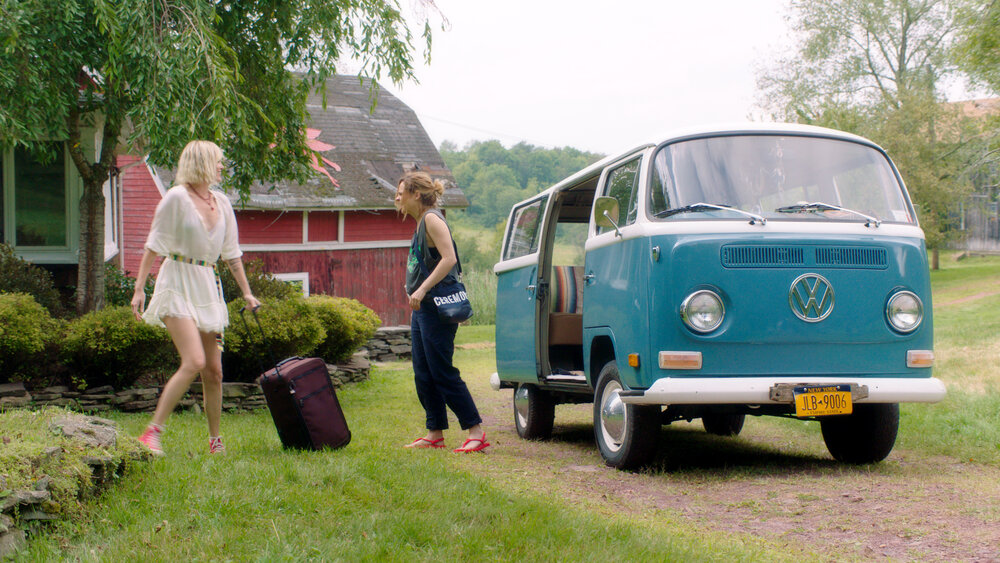By Ali Moosavi.
It’s about his whole cancel culture and internet bullying and the weight that it starts to have on people, if they give it too much emphasis. In the retreat Parker finds what her original passion was… really that’s what gets her through the hard times.”
–Donal Brophy
In The Shuroo Process, a female journalist called Parker (Fiona Dourif, daughter of Brad Dourif of One Flew Over the Cuckoo’s Nest, who has a cameo in this movie) has drank a bit too much and her wild misbehaviour in a media industry event is captured on video and goes viral, resulting in her being fired. Parker goes on a retreat ran by a guru called Shuroo (Donal Brophy) and her journalistic instincts make her delve into the past history of Shuroo to determine if he is a fake. Donal Brophy also co-wrote the script with director Emrhys Cooper, who also directed the film and appears in it as one of the retreat attendees. I spoke with both Donal Brophy and Emrhys Cooper.
Most movies dealing with a guru, evangelist, motivational speaker etc., portray them as crooks and swindlers. While in many real-life cases this has been true to life, many intelligent people passionately follow these people and genuinely believe that they benefit from them. When you were writing the script, what was your mindset?

Emrhys Cooper: We wanted to make it as realistic as possible, because I think these characters have a strange duality of wanting to help people but at the same time taking advantage. They are often portrayed as villains or sinister characters and often when you meet them, they aren’t quite like that. They are very charismatic, and it is not necessary as black and white as a lot of the time they’re portrayed. I think we were very detailed in making it as accurate and realistic as possible and everything that happens at the retreat in the film has actually really happened on other retreats and every exercise you see is based on a real exercise in these self-development courses. We did a lot of research and wanted to make it ring as true as possible.

Donal Brophy: Also, the message of the movie is quite nuanced and that’s by design. We wanted to make sure that we left it to the audience to make up their own minds as to whether or not Shuroo was “charlatan” or not because despite the fact that Parker ran into problems and there were definitely some shady dealings going on at the retreat, she essentially got what she came for. She got clarity, she found herself again and as the old saying goes, “you take one step towards the universe and the universal take two steps towards you”. It’s really about your own personal journey. A lot of these guys can be great and a lot of them can be both great and bad but it’s up to the individual participant as to what they want to get out of it.
You also touch on the role of media and how, in order to get a story, they will do whatever it takes, lie, pretend to be somebody else and so on.
DB: Yes, we’re coming out of a period where up is down and down is up and people can’t really tell what’s right and what’s wrong or what’s true and what’s not. Our movie is essentially set in the world where people have been so polarized and manipulated by the media and we really wanted to show that point of view through Parker where she’s hit rock bottom in the world of journalism that has lost a lot of its integrity and people are in it for their own needs rather than trying to shine light on truth.
The film also highlights the role of social media, where if you make one bad mistake, it could be videoed by somebody’s phone, go viral and become a personal catastrophe.
EC: Yes, they can bring you down just as quickly as they brought you up. I think what’s interesting is with Parker owning her destructive past and embracing change and being vulnerable, she kind of gets a second chance and I think in life we all deserve a second chance so that’s the message of Parker’s social media meltdown.
DB: It’s about his whole cancel culture and internet bullying and the weight that it starts to have on people, if they give it too much emphasis. In the retreat Parker finds what her original passion was, which was writing and journalism, and really that’s what gets her through the hard times, not necessarily the guru or the boyfriend, it’s the work really that saves her in the end.
EC: I think letting go of her trauma, letting go of her past, is also instrumental in in that and I think her just showing up at the retreat was the beginning of her transformation and the beginning of letting go.
Was it fun writing the motivational speeches of Shuroo?

EC: it was actually a lot of fun. We spent a great deal of time watching Tony Robbins and watching and learning about different healers and gurus and courses from Landmark to The Hoffman Process and we were inspired by certain ones and and we also motivated ourselves at times.
DB: From acting viewpoint, it was a very fun part to play.
Can you talk about the scene where there the retreat attendees take part in a masked dance?
EC: I wanted the actors to look very improvised and free and we didn’t do any cuts in that scene, so that it was just one take and we did that about ten times. I want the audience to feel like that they’re actually there.
The psychedelic hallucination scene is visually quite interesting.
EC: We transplanted to California and there’s a lot of very good forward thinking experimental and psychological kind of movements going on over here where people are using Psilocybin which is the chemical ingredient in mushrooms to help people with various kinds of psychological trauma and we find that fascinating. Also in a lot of these retreats now there are many unqualified people who are administering unlicensed psychedelic drugs. We also added some VFX shots to make the audience feel like they were tripping. Despite the trip seeming a little wild, Parker does have a huge breakthrough and releases her trauma and let go of the thing that’s holding it back. I actually find that scene really inspiring and powerful.
Some actors, after they became quite successful, go into the restaurant business but Donal you’ve done it the other way around and gone from being a successful restauranter to acting and writing.

DB: It happened very organically. I originally moved to New York to get into acting and spent my twenties in various acting schools in New York. I then kind of like burnt out with acting in my late twenties. I was bartending to support myself and doing various kind of Avant guard things like Downtown Theater. I decided that I should step back and pursue another passion which is restaurants. I became very knowledgeable on Scotch Whiskey, so I opened my Scotch whiskey bar that became very successful. The irony is that the restaurants were a Mecca for very successful actors and I was actually told to get back into acting by Daniel Day Lewis who was a regular at the restaurant. So I thought there’s something in that, the universe is bringing Daniel Day Lewis to your doorstep telling you to go back into acting and I think should probably pay attention!
EC: And Steven Spielberg gave you advice.
DB: It’s like that Buddhist saying: “If you love something let it go, if it comes back, its yours and if doesn’t, it was never yours to begin with”. That’s like rules for relationships, careers, everything and I loved acting so much that I let it go and then it came back into my life in such a rich and beautiful way and it’s also not just acting now, it’s writing, producing and has also led me to my wonderful partner in life. This time around, it just feels so right and fulfilling and I couldn’t be more grateful.
How did Eric Roberts get involved with this?
EC: Eric and I are friends and we’ve done several movies together and we felt that it would be fun to have a cameo. I just called him up and he’s just such a fantastic actor and wonderful fun guy in real life and he was just game.
He has done over 600 movies in the past 25 years which is probably a record for American actors!
DB: He likes to work! No rhyme or reason, he genuinely enjoys the process. it’s actually quite inspiring. What I admire that about him is that he’s so unpretentious and unphased.
Have you already started planning about your next venture?
DB: Yes, we’ve got a number of projects on our slate. We have a production company called Idlewild Pictures, Idlewild being the town that Emrhys and I live on in the San Bernardino National Forest. We love it so much we decided to name or production company after it. I think on the slate is called Historical Homos, which is a collaboration with our dear friend and co-producer Zachary Quinto. He hosts a podcast called Around the World in 80 Gays! which explores the LGBTQ figures from history.
EC: We’re doing a movie in the spring called Joshua Tree and then I will be adapting a short film I did a few years ago called Trophy Boys for a television series and we’re hopefully doing a movie in Dublin next fall. So we have a busy time ahead of us.
Ali Moosavi has worked in documentary television and has written for Film Magazine (Iran), Cine-Eye (London), and Film International (Sweden). He contributed to the second volume of The Directory of World Cinema: Iran (Intellect, 2015).
Read also:
